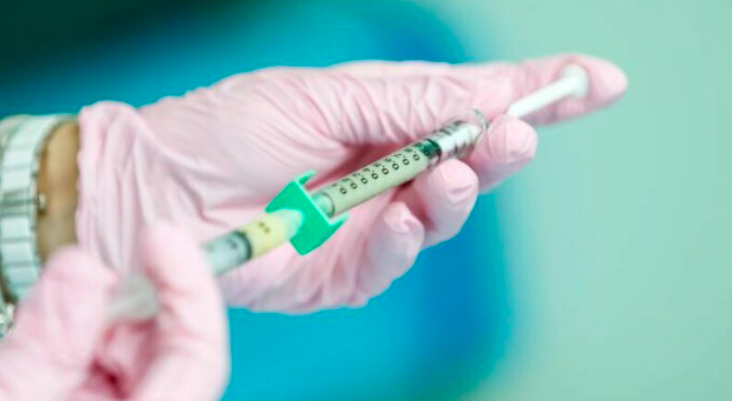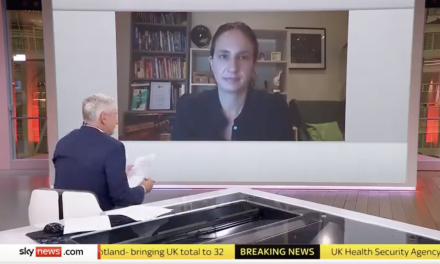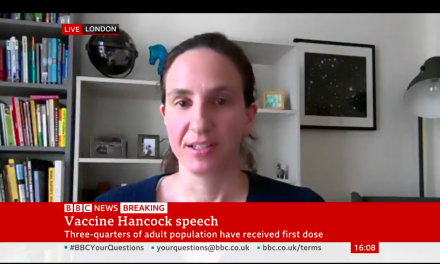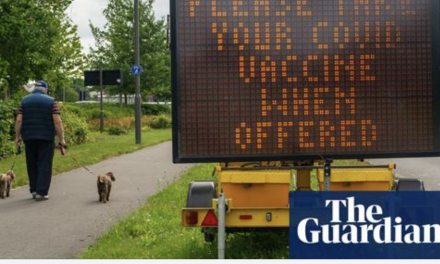last updated 13 April 2021
- TYPES OF VACCINES
- What types of vaccines will be used in the UK and roughly, how do they differ/work?
- At the moment the UK has 3 vaccines, produced by Pfizer, Astra Zeneca (‘Oxford’) and Moderna with more on order as soon as they’re licensed. All are based on the same idea: entry of the virus is blocked by antibodies against the ‘spike’ antigen (the protein on the surface of the virus responsible for attaching to the human cell), so you need a vaccine that can stimulate antibodies against the antigen. The Pfizer and Moderna vaccine does this by getting muscle cells to make a bit of spike protein from RNA. Astra Zeneca does this by putting the spike gene into a common cold virus, which enables cells to produce the harmless spike protein.
- How do they differ from other vaccines in common use?
- All three are of a type of new-generation vaccines that tend to induce really good levels of immunity and have been trialled against various diseases over 10 or more years, though never before used this widely. However, the basic principle of priming the immune system to produce antibodies using individual proteins on the surface of the virus (antigens) is shared with all the old currently used vaccines like flu, polio, tetanus and whooping cough vaccines.
- Will I get any say in which vaccine I receive?
- The main criteria will be availability- with the caveat that new guidance is that AZ/Oxford vaccine is not offered to those aged under 30. The logistics of the roll-out are so challenging that at any given time, a particular centre is unlikely to have a choice and will depend on the overall supply chain at the time.
- DEVELOPMENT PROCESS
- How have Covid-19 vaccines been approved so quickly when normally it takes many years?
- While these specific vaccines have been developed since the virus was first genetically characterised on Jan 10, 2020, they were all ‘plug-and-play’ updates of pre-existing vaccine technology (in other word, they used vaccine development and manufacture systems which were already in place) that had been rigorously developed, tweaked, safety tested, over more than 10-years previously, across many different infections.
- Should I worry about how quickly COVID-19 vaccine has been trialled, tested and certified compared to other vaccines? How do I know the vaccine manufacturing and approval hasn’t been rushed?
- Absolutely not. When one hears about vaccines normally taking several years to produce, that shouldn’t be taken to mean that doing the job well takes many years. The slow pace is due to the fact that, outside a pandemic setting, it can take many years to assemble finance, facilities, volunteers to enrol in clinical trials. In the current circumstances, there was the momentum to pull together and do the job at pace, rooted in a vast background infrastructure from the past efforts. The size and rigour of the clinical trials and approvals by the regulators are set at a high level, with no evidence that any corners were cut. The other major time limit is getting approval for studies which this time was done within weeks rather than months, through intensive work by the regulators.Having said this, very rare side effects, such as the recent description of the clotting syndrome associated with the AZ/Oxford vaccine, will only become apparent after the vaccine has been rolled out to millions of people- since they may not be picked up through trials which rather involved tens of thousands of participants.
- If a dose error was made for the Oxford vaccine, and the trial approved to continue, what about other vaccines?
- It remains unclear why the dose reduction occurred. However, once it was noticed, the Trial team tried to get the most information out of the situation. These issues are regularly examined by external oversight committees, which exist for all such trials. Further trials on the dosing regimes are planned.
- Can we see the data from each trial?
- Each of the vaccines licensed so far has published all of their trial data in openly accessible, peer-reviewed publications in The Lancet ( https://www.thelancet.com/journals/lancet/article/PIIS0140-6736(20)32661-1/fulltext) and The New England Journal of Medicine ( https://www.nejm.org/doi/full/10.1056/NEJMoa2034577). In addition, there is more data available through the evidence packs presented to the US Food and Drug Authority, for instance for the Moderna vaccine (https://www.fda.gov/media/144434/download )
- Has the vaccine been studied in children, pregnant women, people with serious health problems, the elderly, and those with immunosuppression?
- Each of the vaccine trials details any groups that were included or excluded. They cover a large age-range, but not children, and they did not include pregnant women. This is usual for initial clinical trials of a new drug or vaccine. Studies in younger people and pregnant women are underway.
- If the vaccine has not been tested on all these groups, then what precautions should they be taking? And can we continue to keep these groups safe?
- Each vaccine supplier has included specific guidance and restrictions based on their trial and regulatory approval. So, the fact that the vaccine wasn’t specifically tested in a given group, should not be taken to mean it’s unsafe for that group, just that it hasn’t yet been approved. That’s why the vaccines aren’t yet licensed for children. As time goes by and there are more doses and different vaccines on offer, it’s quite likely that some will come to be seen as more appropriate for particular groups. For especially vulnerable groups, there is a potential role for ‘passive protection’ by giving people a direct injection of antibodies that last for some months, instead of a vaccine (that stimulate the body to make its own antibodies). Roll out of the vaccine will be monitored closely to look at its effectiveness and safety in the real world setting including in patient groups who may not have been included in the original studies.
- Has the vaccine been tested in different ethnic groups?
- Yes. Each of the trial publications reports full data about ethnicity of recipients. Indeed, most vaccines have trial sites around the world, so ethnicities included are broad.
:
- EFFECTIVENESS
- Do we have enough data to know it is effective?
- Each of the vaccines in use has published their efficacy data. In the trials and for approvals, efficacy is defined as the protection against symptomatic infection. For instance, a 50% efficacy means that the vaccine halves the risk of getting Covid-19 severely enough to get symptoms compared to not getting the vaccine. At a population level the current vaccines have efficacies in the 80-96% range after the recommended number of doses used in the trials – far better than anyone expected.
- What reduces the vaccine efficacy- co-morbidities, other vaccines, drugs?
- We had thought ‘old-age’ would be top of the list, but they actually seem to work well in the elderly in generating good immune responses. That probably leaves obesity as the leading factor that could hypothetically influence/reduce vaccine effectiveness, aside from obvious (but rarer) issues like immune-deficiencies.
- How long after the vaccine is administered does it become effective?
- There has been some confusion about this! At a population level, the government has argued that by 2-weeks after the first dose, there’s enough beneficial effect to greatly decrease severe disease and hospitalisations. While that seems to be the case, at an individual level, nobody should consider themselves ‘safe’ until at least 14 days after the second dose.
- If new variants develop, does that affect the effectiveness of the vaccine?
- Potentially – this is an ongoing focus, with a current view that it is probably not a concern for the B.1.1.7 (‘Kent’) variant spreading in the UK but may possibly be for the South African variant. There is some evidence that the Astra Zeneca (Oxford) vaccine is much less effective against the South African variant. There is a real danger that further variants will arise that will affect existing vaccines. Constant monitoring of new variants is necessary, and already happening in many countries. Keeping cases of Covid as low as possible will deprive the virus of opportunities to mutate further.
- SAFETY, SIDE EFFECTS AND CONTRAINDICATIONS
- What are some of the known side-effects of the vaccine?
- Each of the vaccine manufacturers have published detailed data on side-effects. In summary there are many common but mild side-effects. These are tenderness, soreness, injection-site pain, redness on the day of injection, along with possible tiredness and fever on the day. More serious side effects have been incredibly rare, such as the small number of people, known to have previously suffered anaphylactic reactions, who made an anaphylactic reaction to the Pfizer vaccine (but were all fine afterwards). A syndrome called vaccine-induced immune thrombotic thrombocytopenia has been described as an extremely rare side effect of the AZ/Oxford vaccine (https://www.nejm.org/doi/full/10.1056/NEJMoa2104882). 79 such cases have been described amongst more than 20 million vaccine recipients in the UK.
- Who should NOT get the vaccine? I.e., What are the contra-indications?
- Specific advice is updated here: https://www.sps.nhs.uk/articles/contraindications-and-cautions-summary-for-pfizer-biontech-covid-19-vaccine/
- Do we have enough data to know it is safe?
- The vaccines have each been scrutinised in very rigorous trials and approved by a very stringent regulatory process and seem safe.
- How can clinical scientists be so confident that there are no long-term effects of the new vaccines, particularly where new technologies are used?
- There’s strong confidence based on the fact that each vaccine technology has been researched and trialled for more than 10 years, with an enormous amount of knowledge accumulated for each. In addition, these are not “live vaccines” as used in some vaccinations, so they cannot give you Covid-19.
- How are the long-term effects of the vaccine monitored?
- Several programmes have been put in place for long-term monitoring by Public Health England (PHE) and others, with more planned. These are being replicated internationally too.
- Will foreign genetic material end up in every cell of my body?
The material that mimics the virus’s surface protein (the antigen) to stimulate your body to make antibodies against it is only carried in your cells for a few days, then cleared. There is no mechanism that could allow it to become incorporated into human DNA.
- Do some of the vaccines mean I will make spike proteins forever?
- No – the idea of the vaccine is that your immune cells should retain a long-term memory of having met the Covid-19 spike protein before, and so be ready to respond instantly on next encounter. We currently do not know how long the immunity will last and again this is being monitored closely.
- Will the mRNA vaccine become a permanent part of the body?
- No – there is no mechanism that could make this happen.
- Could there be genetic chain reactions? Why would induced genetic processes then stop?
- There is no genetic process established, just brief production of spike proteins that mimic those on the virus, so no chain reactions are possible.
- Will the vaccine be safe in those who have ‘Long COVID’?
- There’s no evidence to suggest otherwise. Many with ‘Long COVID’ worry about reinfection, and a vaccine seems the best way to prevent this although whether it prevents long covid is not yet known. Surveys are in progress to monitor the impact of vaccination among people in long Covid groups.
- Will the vaccine be safe in those who have had COVID?
- Those who have had COVID are advised to get the vaccine and that it’s safe.
- Is it safe to receive if living in a multigenerational household, or with vulnerable individuals?
Yes
- Is it safe to have the vaccine if you are breastfeeding?
- Current advice from JCVI is: “There is no known risk associated with giving non-live vaccines whilst breastfeeding. JCVI advises that breastfeeding women may be offered vaccination with the Pfizer-BioNTech or AstraZeneca COVID-19 vaccines.”
- https://www.gov.uk/government/publications/priority-groups-for-coronavirus-covid-19-vaccination-advice-from-the-jcvi-30-december-2020/joint-committee-on-vaccination-and-immunisation-advice-on-priority-groups-for-covid-19-vaccination-30-december-2020
- Can the flu vaccine be given at the same time?
- The advice until recently had been to space them apart by at least 7 days, though the latest advice is that they can be given at the same time.
- https://www.england.nhs.uk/coronavirus/wp-content/uploads/sites/52/2020/12/C1038-COVID-19-Vaccine-Deployment-in-Community-Settings-LVS-SOP-v3.2-14-January-2021.pdf
- How do we know what the effect will be on fertility?
- From trials and from the science behind the vaccine there’s no reason to expect any impact on male or female fertility.
- Will vaccination prevent ‘Long COVID’ in those who already have long-term symptoms?
- There is currently not enough evidence to answer this question. However, it is unlikely to make the situation worse and will of course reduce the risk of second infections.
- VACCINATION STRATEGY
- What happens if the second dose is missed?
- It is important, if possible, to get the second dose, even if it’s late, to get the most immunity possible.
- Must the two doses be the same vaccine?
- The guidance has been yes, except if its unavoidable to mix due to supply issues. There’s no immunological reason to argue against two different vaccines – it may even be better – and there are ongoing trials testing the mixing of vaccines that should have results by the summer of 2021.
- I’ve already had COVID; do I still need to be vaccinated? Why?
- Yes you should get vaccinated. There are two problems with not vaccinating those previously infected. The first is just the uncertainty in people’s NHS record as to who has been infected, when so many never accessed a PCR test. The second is that ‘natural’ immunity to the virus is more fragile and short-lived than vaccine-induced, and less likely to give lasting protection. Current indications are that the ‘natural’ immunity lasts at least 5 to 6 months while vaccine protection is expected to last considerably longer. Indeed, those given vaccine some time after having natural infection appear to have higher levels of antibody generated than those without prior natural infection. Therefore vaccine protection is expected to last considerably longer.
- Should different vaccines be targeted to different groups? Why?
As the vaccine programme evolves, if we have several vaccines on offer, we may in time come to decide that some are a better fit for various groups, for example, non-Pfizer vaccines for those with a history of severe allergic reactions (anaphylaxis).
- Who needs to be vaccinated?
- For the moment, the JCVI (Joint Committee on Vaccination and Immunisation) has developed a targeted list for roll-out to get maximum benefit in reducing severe cases and deaths. As time goes by, it needs to be offered to all adults.
- What coverage is needed?
- We need to vaccinate as many people as possible: particularly in light of the increased transmissibility of the new COVID variants, it’s currently thought this needs to be over 80% of the population.
- Is the best vaccination strategy to start with the most vulnerable, or is it to start with those who are having the most social contacts?
- A big debate! Different countries have reached slightly different answers. The JCVI view was that their priority groups will be most effective in reduce deaths from Covid-19 as quickly as possible. You can read their recommendation and rationale here: https://assets.publishing.service.gov.uk/government/uploads/system/uploads/attachment_data/file/950113/jcvi-advice-on-priority-groups-for-covid-19-vaccination-30-dec-2020-revised.pdf
- What steps do you think local authorities can take to engage black and minority ethnic communities on vaccine hesitancy?
- This is an important question given the lower uptake of the vaccine so far in minority ethnic populations. One important reason for this is experiences of discrimination and under-representation of diverse ethnicities in research in general, contributing to low levels of trust. So it will be vital that local embedded organisations including local authorities and local public health offices work to create and built trust. The approaches to doing so will differ in different contexts requiring a willingness to listen to, and act upon concerns of these communities, and could include making it easy to access vaccination (addressing physical and cultural access barriers), local adaptation of the vaccination process and working with influential actors to spread reliable information and dispel myths. Importantly it is important that these approaches should be part of sustained efforts to address broader health inequalities, maintaining engagement to (re)-build trust in the healthcare system among people from black and minority ethnic backgrounds.
- AFTER VACCINATION…
- How long will protection last? And will we have to get vaccinated regularly (e.g., every year like for the flu vaccine)?
- We don’t yet know. We need really good population monitoring to keep an eye on levels of protection across all demographic groups (e.g. different ages, ethnicities and underlying health conditions) so that we can understand if protection lasts for 12, 18, 24 months or longer. This will be influenced by the emergence of new COVID strains which might necessitate updating of existing vaccines if these new strains emerge that reduce the effectiveness of the existing vaccines. Ongoing surveillance will be key to monitoring changes to the virus over time.
- Will population immunity be developed?
Unlikely, at least for the next year.
Population immunity refers to the situation when enough of the population has immunity (whether because of previous infection or vaccination) that there are not enough people left who can get infected for the virus to keep spreading.
With the new, more transmissible, variant now dominant in the UK, population immunity would likely require at least 80% of the population to be immune. However, the real world effectiveness of the vaccines (always a little less than in the messy world than in highly controlled trials) means that this would require vaccinating at least 90% of the population. This is incredibly hard to achieve in practice, especially since the vaccines are currently not licenced for children.
Even if population immunity was reached, there would remain pockets where outbreaks could occur because of lower vaccine uptake or in-migration (and birth) of people who are susceptible.
Further, the duration of protection following vaccination remains unclear, which may require regular booster doses.
This means that a policy of vaccinating as many people as possible must be combined with other public health strategies to manage and squash outbreaks as and when they occur.
- When can we go back to normal?
- Mass vaccination will help enormously, but there will still be localised outbreaks requiring complementary public health strategies. These must include effective find, test, trace, isolate & support infrastructure, and likely maintenance of some social distancing and hygiene behaviours for at least the rest of the year. Hopefully, by next year, if we can prevent new variants emerging or spreading, we can hope for a return to more normality.
- Will boosters be needed and if so, how do we make sure everyone understands why?
- Boosters will be needed if immunity from current vaccines wanes a lot over time or if new variants emerge that the current vaccines do not protect against. We need to keep collecting really good, large-scale immune monitoring data to ensure that we are ready with booster vaccinations should they be needed.
- Can I still pass on the virus if I’ve been fully vaccinated?
Yes, although it is likely that the chance of this happening is much less than for someone who has not been vaccinated.
The Pfizer and Moderna vaccine trials so far did not test for this, so we do not know how well Pfizer and Moderna prevent people from passing on the virus, even if they do not get sick with Covid. It is likely that both vaccines are at least somewhat effective at reducing the chance of onward infection and we will know more as millions of people get vaccinated over the coming months.
The Astra Zeneca (Oxford) vaccine did check for this in their trial, and found that their vaccine reduced the chance of passing on the infection by about 66%, so that the chance of infecting someone else with Covid after vaccination is only about a third of that of someone who has not been vaccinated.
- Can I travel to other countries without self-isolating if I have had the COVID-19 vaccine?
- This depends on the border policies of each country. However, the vaccine itself does not make you infectious.
- If I’m already vaccinated and then come into contact with someone with COVID, do I still need to isolate? And if so, why?
- We don’t think there’s guidance on this yet, but the sensible answer seems to be ‘yes’ as we don’t yet know how much the vaccine prevents you from being able to pass on infection. As we get more data, this might well change.
- If someone has had their second dose but I haven’t, can I hug them?
- This is not ideal because the first dose offers partial protection and so they might still be able to catch Covid – particularly in the first few weeks after their dose. They might also be able to pass on Covid to you. From emerging data from the Astra Zeneca vaccine, we expect that they will at least partially protect and that this protection will get stronger after both doses.
- If both me and someone else have had two doses, can we hug?
- As the impact of vaccination on transmission is likely to be partial at best, it remains possible that vaccinated people can pass on the infection to others. Another reason for caution is the emergence of new variants in different parts of the world, including the UK, with unknown impacts on effectiveness of the vaccines. And so, the quickest route to normality such as giving hugs is to ensure good uptake of vaccination and a strong local elimination strategy (involving an effective contact tracing, isolation and support system, border management measures to prevent importation of new cases and implementation of COVID secure measures in work places and institutions) as well as global solidarity to ensure access to vaccines globally (to reduce risk of emergence of new strains and cross-border infections).
- If new variants develop, will I need to get vaccinated again?
- It depends on if evidence says the variants can definitely evade the vaccine protection. Current vaccines do protect against known concerning variants, but the Astra Zeneca (Oxford) vaccine has been shown to work less well on the variant that was first discovered in South Africa. Vaccine producers are already preparing booster vaccines for new variants.
- If I think I am experiencing a side effect of the vaccine, what should I do? how can I report this?
- Yes, you’ll be given contact details to report this.
- A friend tested positive 3 days after her first dose of the vaccine. She then displayed some mild symptoms. Can you please explain what possibly happened there?
- There are a couple of potential explanations. Firstly, as people can be infectious up to five days before developing symptoms (i.e. asymptomatic) it is possible that they already had COVID-19 when they were vaccinated and symptoms only developed a few days later. Secondly, it’s important to remember that it takes about 10-14 days after vaccination to develop a significant immune response. So it is possible that they were exposed to and developed disease after vaccination. This is why it’s important that people continue to strictly follow the guidelines (face coverings, social distancing, ventilated indoor spaces etc) even after vaccination.





